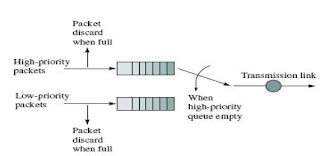*Second queue
scheduling approach which defines number of priority classes.
* A separate
buffer is maintained for each priority class.
* High priority
queue serviced until empty and high priority queue has lower waiting time
* Buffers can be
dimensioned for different loss probabilities
* Surge in high
priority queue can cause low priority queue to starve for resources.
* It provides
differential QoS.
* High-priority
classes can hog all of the bandwidth & starve lower priority classes
* Need to
provide some isolation between classes
Sorting packets according
to priority tags/Earliest due Date Scheduling
* Third approach
to queue scheduling
* Sorting
packets according to priority tags which reflect the urgency of packet needs to
be transmitted.
* Add Priority
tag to packet, which consists of priority class followed by the arrival time of
a packet.
* Sort the packet in queue according to tag
and serve according to HOL priority system
* Queue in order
of “due date”.
* The packets
which requires low delay get earlier due date and packets without delay get
indefinite or very long due dates







0 comments